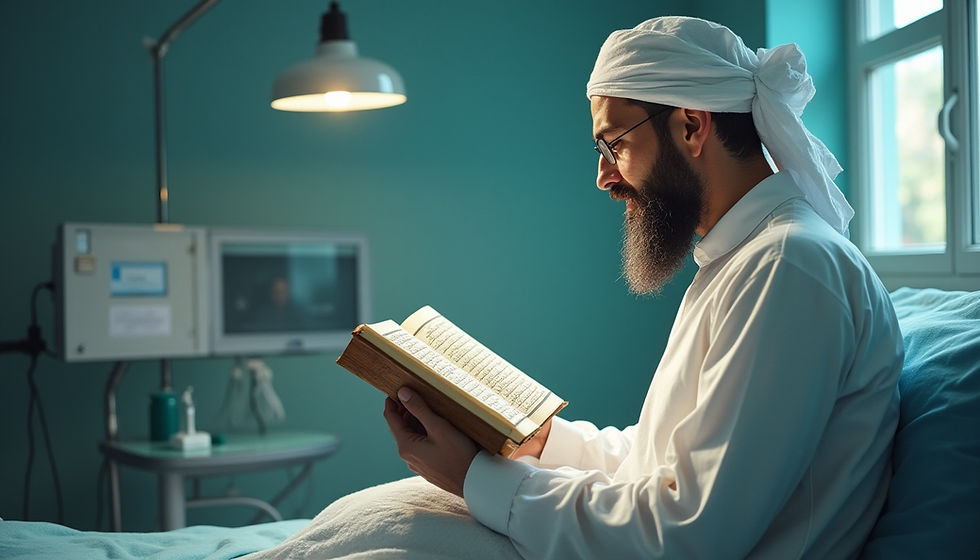The Best Approach to Ruqya in the 21st Century
- Shaykh Abu Ubaid

- Jan 27, 2020
- 3 min read
The Raqi stabilises the Human Being inside first and foremost before any direct intensive ruqya treatments are performed on the patient. He may do this by casually speaking to the patient, holding a normal-like-conversation about their life and finding out the root issues which are causing them distress, pain, grief, anger, mood swings etc. The more the patient is able to express their emotions with words, the more stable the Human Being inside will be.
The Raqi gives the patient the space and time to relax and describe their illness. A relaxed environment will enable them more to speak about their ailments in greater detail. The more the patient is able to provide detailed descriptions of their illness and what happens to them, the more they will feel like themselves, the more they will be able to think clearly, logically and rationally. The Raqi will engage the patient with questions & queries so that the patient's thought process becomes clear and aligned with reality. The more this conversation, therapy & describing of their illness is done by the patient, the more they will be able to distinguish between the different types of illnesses and their symptoms.
Once the patient is able to express their illnesses in detail and the emotions behind them have lessened i.e. they are not crying, raging — that is a sign that their Human Self is now becoming stable.
Whilst the Human Being inside is slowly stabilising, from the first session the Raqi will begin to prescribe general treatments to the patient. For example, he may request them to play the Quran throughout the day and night with the specific intentions of cure. He will ask them to pray on time, maintain wudu as much as possible, spray the room and house before going to sleep, recite the Quran with the intention of cure, shower with recited water and apply recited oil thereafter, consume black seed and honey, do hijamah (cupping) etc. All of this is general ruqya.
When the patient is stable, and comfortable to do ruqya by themselves, the Raqi will instruct the patient to recite & blow into their own hands and wipe over their own body. The specific, direct & intense ruqya can now be performed by the patient themselves, where they sit down with the intention of burning away the sources of sihr, evil eye & the shayatin — reciting & repeating the Verses & Duas of Ruqya until they are fully exhausted. This is only actioned when the patient is strong enough and more in control of themselves.
Once the patient is comfortable with that stage then the Raqi starts to recite in the hourly sessions until the patient cannot endure it any longer. The Raqi stops and lets the patient recite and continue.
When these stages are met, now finally the Raqi and the patient both together attack directly the sources of sihr, evil eye & the shayatin by intentions and recitations (of no more than 3 hours) . No ruqya treatment administered by a Raqi ought to continue beyond 3 hours.
If the Human inside is not stable but is need of ruqya on him (e.g. patient is fully possessed for long periods at a time, patient is being physically harmed) then the Raqi may recite at length on the patient or instruct the family to play the Quran while placing large headphones (covering the ear fully) with the volume put at high, restraining the hands (if required). The treatment may only be paused for bathroom breaks and nutrition. No shaytan —no matter how strong it is or what it came with— can withstand 3 days of continuous Quran recitation being heard loudly (with the headphones). It will either leave, become weak or start speaking in order to leave. If it is arrogant & stubborn and the Quran recitation continues being played into the ear it will eventually die Bi-Idhnillahi-Ta'ala.
With ruqya, counselling and medical/mental route ought to be taken by the patient or the family of the patient (in the event that the patient does not go on their own will) especially when there was childhood or past trauma. Counselling, therapy and medical assistance always helps a patient of spiritual illness.
Emotional support from family & friends is crucial to the stability & cure of the patient. In cases of sihr, the family ought to partake in the treatment along with the patient as the main source of the sihr may be with any of the family members. Moreover, patients are cured more quickly when the family is actively performing the treatment with them. The Raqi always advises family & friends to support & assist the patient in every way possible.
May Allah cure and protect all of us! Allahumma Amin!!




Comments